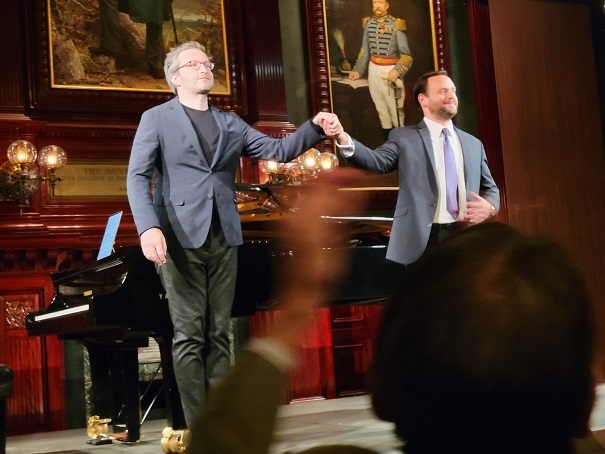Concert Diary: Tenor Paul Appleby
September 21, 2021
New York, N.Y.
The most intimate type of concert is a song recital. The singer stands with no obstruction between the body and the audience. No microphone, of course, or ugly electronics wrapped around the head, and usually not even even a music stand. If necessary, the singer can step back and touch the accompanist’s piano, maybe even lean against it, but it offers no buffer between the direct connection of singer and audience.
Yesterday evening, we saw tenor Paul Appleby at the Park Avenue Armory brave these performance challanges in a program of songs by Beethoven, Schubert, Schumann, and Alban Berg, the first installment of a series of three recitals between now and November. We have seen Paul Appleby at least twice on the stage of the Metropolitan Opera, but this was the first time we saw him in a recital setting.
The Park Avenue Armory was originally built by the Seventh Regiment of the National Guard to answer Lincoln’s 1861 call for troops to battle pro-slavery insurgents in the American South.
The Armory has a large space (originally a Drill Hall) for big concerts and theater events, but recitals are held in the smaller Board of Officers Room with a little stage barely large enough for a piano, and seating for about 100 people. I didn’t see anybody complain when vaccination cards where checked at the door, and everyone wore face masks while inside the building.
The core of the program — and Paul Appleby’s original impetus — was pairing Beethoven’s An die ferne Geliebte ("To the Distant Beloved") from 1816, commonly regarded as the first significant song cycle, with Alban Berg’s 1911 Five Orchestral Songs on Postcards from Peter Altenberg. Both song cycles convey a strong sense of loss and longing, and Appleby selected seven songs by Schubert and nine by Schumann to fill out the program.
Although I was well familiar with a number of recorded performances of An die ferne Geliebte from my year of Beethoven, I had never seen the song cycle performed live. Paul Appleby and his pianist Conor Hannick gave a lovely performance of these “artless” songs, and the reappearance of the opening melody towards the end works so well in a live setting that it gives the work a real emotional jolt to provide a reconciliation to the yearning for the distant beloved.
Berg’s Altenberg Lieder are often performanced by a powerful mezzo-soprano with an orchestral accompaniment, but the piano reduction made by Hans Erick Apostle is fascinating in itself and had Conor Hanick reaching into the piano strings. It worked well in a recital setting, and I loved Appleby’s handling of these hyper-expressive songs that pushed the envelope of tonality in a way that would characterize one of the prominant arcs of 20th-century music.
The sets of Schubert and Schumann songs all fit somehow into the theme of pain and longing, although in very different ways. Schubert’s late “In Frühling” ("In Spring") seems almost like a mini-Winterreise, while “Alinde” (a woman’s name) is a folksy search for a beloved who mysteriously appears only at the end in an echo, but “Der Zwerg” ("The Drawf") is truly grotesque in its recounting of betrayal and revenge between a “queen and her drawf.”
Paul Appleby is on the right and Conor Hanick on the left in this photograph that I took during curtainless curtain calls:
As an encore, Paul Appleby spoke to the audience a bit about the loss many of us have experienced during the COVID pandemic, and dedicated to two of his music teachers who had died during the period a moving rendition of Nina Simone’s “If You Knew.”

